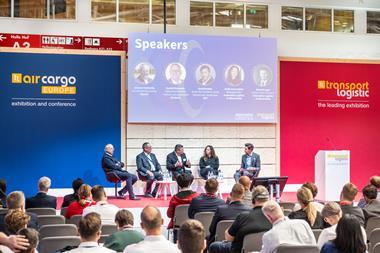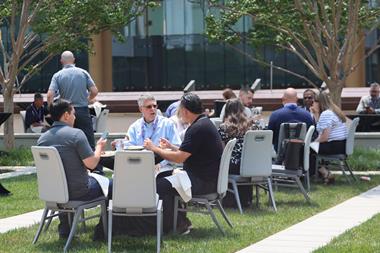Japan’s NYK Group is in the process of merging its contract logistics division with its airfreight forwarding business to create a global entity called Yusen Logistics. Marcus Williams reports on the how it is aiming to provide a tailor-made service that will better serve the needs of its automotive customers.
The integration of NYK Group’s contract logistics division, NYK Logistics, and its airfreight forwarding business, Yusen Air & Sea Service (YAS), into a new company called Yusen Logistics has been underway since October last year. Announced by the group’s president Yasumi Kudo at the beginning of 2010, the move was instigated “to establish a structure capable of fully serving all logistics needs of its customers,” said Kudo.
The ‘Yusen’ title, which translates as ‘mail shipping’, comes from NYK’s full title–Nippon Yusen Kabushiki Kaisha–and was chosen, according to Shinsuke Masuda, general manager of corporate communications and international relations, because of its strong brand power both in Japan and overseas; preferable, according to the company, to choosing a completely new name “that would take time to penetrate”.
“We wanted to develop an integrated logistics business while carrying on the DNA of both YAS and NYK Logistics. At the same time, we wanted to show our position as a new company that is part of NYK Group,” says Masuda.
The new organisation, which will be headed by president Shunichi Yano, is being phased in globally through to March next year, with the next stage of integration in both Europe and the US set to commence at the beginning of April. The specific time required for each region will depend on the need to cater for the different regulations and taxation systems, especially given the scope of European countries.
 Once this is fully rolled out, however, the company says it will expand individual scope and provide “a tailor-made global logistics service” for the industry.
Once this is fully rolled out, however, the company says it will expand individual scope and provide “a tailor-made global logistics service” for the industry.
“We will strengthen sales by focusing on the target segments by customer or industrial field and share them in every region of the world,” says Masuda. “Our market approach in the past was somewhat vague, so we will strengthen our approach much more to the market by consolidating our selling capacity.”
Until full integration, including Europe and the US, it remains difficult to glean any early practical examples of where this tailor-made, one-stop-shop service is better serving the logistics needs of global automotive customers, and the company says it is difficult to give a percentage in terms of automotive parts alone. But for Yusen Logistics the service will primarily target tier one and two suppliers that serve the major automotive OEMs around the world. The company mainly deals with inbound and aftermarket services, and in Europe it will build on recent successes with companies such as Ford in Hungary and Nissan in Barcelona, Spain and the UK. It will, however, incorporate some of the finished vehicle transport currently handled by NYK Logistics. Automotive customers are also promised additional PDI operations, terminal services, as well as milk run and cross-dock provision.
“As an integrated logistics business, we will pursue an even more detailed and high-quality service in airfreight and ocean freight forwarding and contract logistics,” adds Masuda.
In Asia, meanwhile, the company has stationed a team in Thailand specialising in automotive to deploy sales covering the whole region. This team exemplifies how the integrated approach taken by Yusen Logistics is mobilising resources available to it across the wider NYK Group divisions for an increased share in growth markets.
In China and India, Yusen is looking forward to providing new services for high-economic growth. “Since we already have local overseas corporations in critical sites in both China and India, we want to diversify the services of the existing sites and otherwise enhance the level of service,” says Masuda. “In particular, China is becoming increasingly attractive each year as a consumer region and as such we have our sights also set on deploying even further inland.”
As NYK Logistics, the company already has a strong presence there. The opening of Qinzhou port in January last year added a fifth port in China handling automotive traffic with good coastal infrastructure. While this infrastructure is a still a problem further inland, the company is opening branches along the Yangtze river in anticipation of business growth. It has branches in Nanjing, in Jiangsu Province, and Wuhan, Hubei Province. It is also planning to open inland branches in Chongqing and Chengdu.
Following a delivery of 100 units from Lohr and Dongfeng- Nissan Commercial Vehicle last year, NYK Logistics took its fleet of car trailers in China to 700, putting it amongst the leading foreign-capitalised companies providing finished car transport services in the country. Dongfeng-Nissan, BMW, Porsche, Toyota, Geely and Changan Mazda are among the major OEMs supported by this inland business.
This is all part of the steady growth in automotive distribution that NYK Logistics and YAS have seen in the Asian region over the last few years, a trend that as Yusen, it intends to make effective use of through the organisational change and its links with the wider NYK Group. This includes working in new fields such as electric vehicle parts.
“The environmental initiatives of the automobile industry resonate with our awareness of the environment, so we also want to be actively involved in the distribution of parts that help conserve the environment or save energy,” says Masuda.
Environmental considerations are being given incentive closer to the balance sheets with the recent rise in oil prices, which has been putting increasing demands on logistics providers to find cost savings in distribution to offset them. “Unstable and unpredictable trends in crude oil prices are giving us a headache,” admits Masuda. “Regarding the fuel surcharge, we will continue to negotiate to obtain the understanding of our customers.”
While this includes an appeal by NYK Group for a revision to the common bunker cost clause, Masuda says the company is working on ways of reducing the total logistics costs for its customers by using indirect flights for airfreight, using consolidation services for truck transport and enforcing energy-saving driving.
Against longer supply routes threatening higher expenditure, Yusen says that there are opportunities for services that meet the needs of OEM moves to localise production and supply chains. For Japanese companies the yen’s high value against the dollar and euro could prove a challenge in this direction because of the drop in exports, exacerbated by market volatility lately fed by the devastating earthquake to hit Japan in March. As Automotive Logistics went to print, the yen hit its strongest level against the US dollar since the end of World War II. But this is not a problem according to Masuda.
“The influence of the strong yen on exports from Japan certainly exists, but we regard this as an opportunity. We are not targeting only goods coming from Japan. There is now a high rate of intra-regional exports from countries other than Japan. In the future we will deploy on a more global scale, so all our services will be fused with air and ocean freight forwarding that link countries throughout the world.”
By March 2012 it should be clearer whether closer integration across global regions and the knowledge built up across other sectors, such as energy, pharmaceutical and aviation, will bring the advantages for Yusen’s inbound automotive offering-namely those of seamless operation, better capacity through consolidation and higher standards of service.
Yusen Logistics certainly has enough global turmoil at the moment, from volatile fuel rates to the fallout for the supply chain that the crisis in Japan presents, to test the advantages of its tailor-made solution.




































